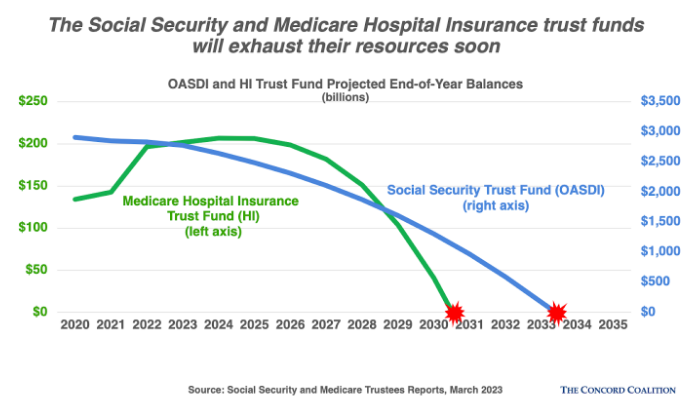WASHINGTON, DC — The Concord Coalition said today that this year’s reports from the Social Security and Medicare trustees demonstrate an urgent need for action to avoid severe benefit cuts by 2034 for Social Security’s combined retirement and disability programs, and by 2031 for Medicare Part A (Hospital Insurance).

“Doing nothing to improve the financial outlook of Social Security and Medicare is not ‘standing up for seniors.’ It is political cowardice and fiscal malfeasance,” said Concord Coalition executive director Robert L. Bixby.
“These two programs are enormously important for millions of American families who rely on them for current or future retirement income, disability benefits, and healthcare needs. Under current law, however, the only thing anyone can rely on is the certainty that Social Security and Medicare face sudden cuts if Congress and the president fail to act. It is deeply disappointing that lawmakers of both parties routinely ignore the trustees’ warnings. With insolvency moving closer, they should make it a priority this year to find solutions that are both fiscally and generationally responsible,” Bixby said.
As detailed in the reports, both programs contribute to steadily rising budget deficits while at the same time neither program can pay the full amount of scheduled benefits under current law. Ignoring the warnings in these reports will leave the public unprepared for changes that must inevitably be made to put these vital programs on a sustainable trajectory.
Bixby added: “The trustees’ warnings are all the more urgent because the nation is not in a position of current or projected fiscal strength. Delaying reforms would force abrupt changes to benefits or a massive infusion of general revenues. Either result would exaggerate generational inequalities.”
To illustrate the magnitude of the challenge, the Social Security trustees estimate that one of three things must happen to keep the retirement program solvent over the next 75 years: (1) dedicated revenues would have to increase by an amount equal to an immediate and permanent payroll tax increase of 3.44 percentage points — from 12.4 percent to 15.84 percent, an immediate 27.7 percent increase; (2) scheduled benefits would have to be immediately and permanently reduced, for all current and future beneficiaries, by 21.3 percent, or (3) a combination of the two.
The trustees further note that, “If actions are deferred for several years, the changes necessary to maintain Social Security solvency through 2097 become concentrated on fewer years and fewer generations”
As a budgetary matter, it is also important to note that Social Security and Medicare do not “pay for themselves.” The trustees’ reports confirm that Social Security and Medicare Part A will experience growing cash deficits in the future as they pay out more than they receive from their dedicated resources.
General federal revenues also support Medicare Part B, which provides various medical services, and Medicare Part D, which helps pay for prescription drugs. By design, the premiums that older Americans pay for these elements of Medicare cover only about 25 percent of their costs. According to the trustees’ report, Social Security and Medicare had a net draw on the budget of $457 billion in 2022. This consisted of $83 billion for Social Security and $374 billion for Medicare.
The Concord Coalition also lamented that for the eighth year in a row, the public trustee positions have been left vacant. “This is a very serious omission, “ Bixby said. “We urge President Biden and Congress to agree on two credible candidates to fill these crucial positions in time for them to have a meaningful role in preparing the 2024 report.”




